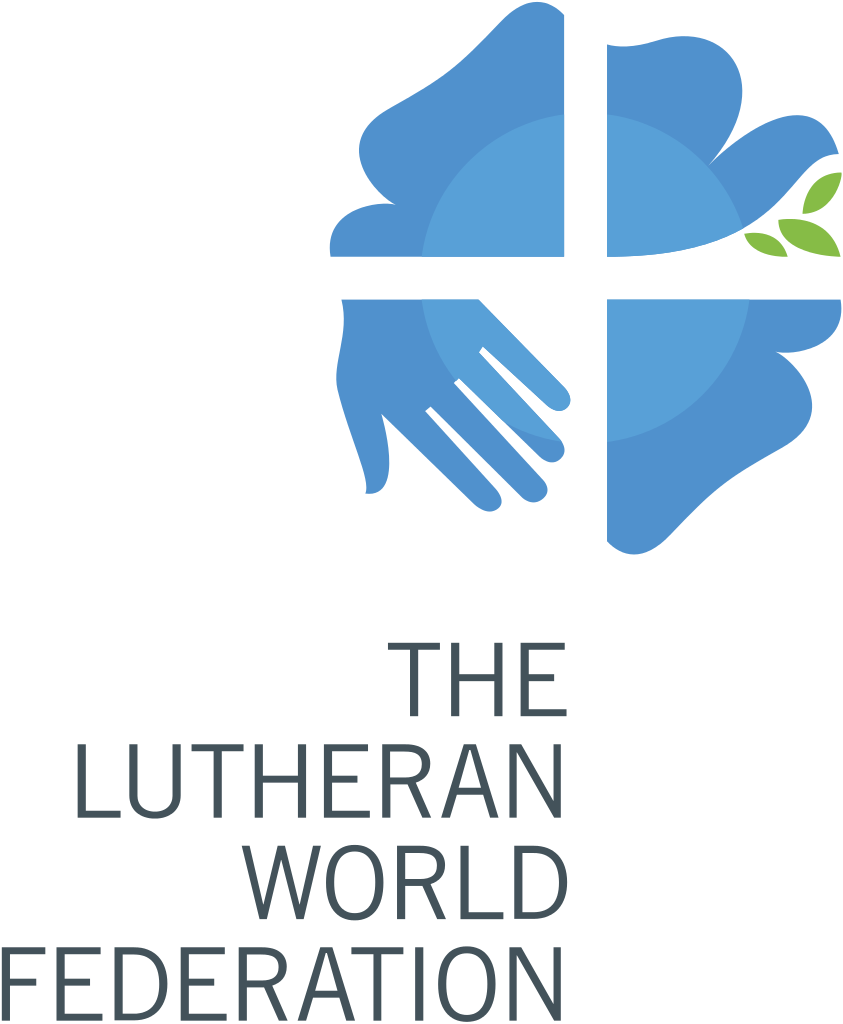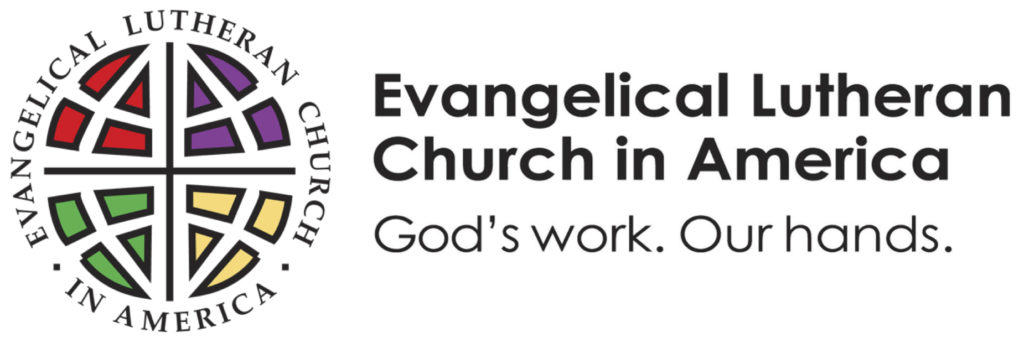
ELCA Missionaries in Jerusalem – see them
Pastor Carrie Smith
Jeni and Colin Grangaard
2015-2016 Young Adults in Global Mission

The Young Adults in Global Mission (YAGM) program have 6 young adults serving in Jerusalem and the West Bank.
Read about their experiences on their blogs:
Ralen Robinson: https://travleronajourney.wordpress.com/
Rachel Bash: https://rachelbash.wordpress.com/
Patrick McClain: https://patrickmcclain192.wordpress.com
Read about the experience of some past ELCA Accompaniers:
Tammie Danielson: http://livingstonesofpalestine.wordpress.com/
Chris Cowan: http://christiarts.wordpress.com/
Amy Kienzle: http://thingsthatmake4peace.wordpress.com/
Kimmy Meinecke: http://www.peacesalaamshalom.blogspot.com/
Kathleen Preuss: http://witness4peace.wordpress.com/
Young Adults in Global Mission
Source: http://www.elca.org/en/Our-Work/Global-Church/Global-Mission/Young-Adults-in-Global-Mission/Jerusalem-and-West-Bank?_ga=1.162522997.890803865.1490320724
The ELCA Young Adults in Global Mission assignments in the Jerusalem and the West Bank context are largely set by our companion church, the Evangelical Lutheran Church in Jordan and the Holy Land, as the best matches for the goals of the program. The program has some room to continue to evolve as needs change, or as gifts and backgrounds of volunteers suggest; however, they are currently as follows, as these settings largely fit the needs identified for us by the leadership of the church (ELCA young adults may be assigned to one or more):
• English class assistant is the most common assignment. The ELCA young adults function as native English speakers who assist teachers in K-12 classes at the schools. This assistance takes many forms depending on the situation and background of the volunteer — from small-group work, to tutoring, to leading an activity occasionally in support of the lead teacher.
• ELCA young adults may assist students with visual impairments and other special needs, particularly the volunteer serving at the Helen Keller School for the Visually Impaired in Jerusalem.
• Kindergarten assistants often provide help with recreational activities, field trips, etc.
• Nursery school and daycare assistants support the work of lead teachers with very young children, often of diverse national and cultural backgrounds. This is heavily the work of the person serving at Al-Mahaba Kindergarten on the Mount of Olives.
• Young adults often get involved in after-school activities such as swimming or other sports, music, drama or dance, photography, visual arts, etc.
• Communications assistance, including writing and proof-reading, editing, photography assistance is often needed, especially for English-language materials at the schools, the environmental educational center, and occasionally at some other ministries. This work sometimes involves research as well.
• Event planning is sometimes needed, and general administrative and office work is sometimes also assigned (copying, compiling, etc). The latter is not the primary work of ELCA young adults, though the writing and editing, event-planning, and research work is the focus of the person serving at the Environmental Education Center, where the work takes place mostly in an office environment.
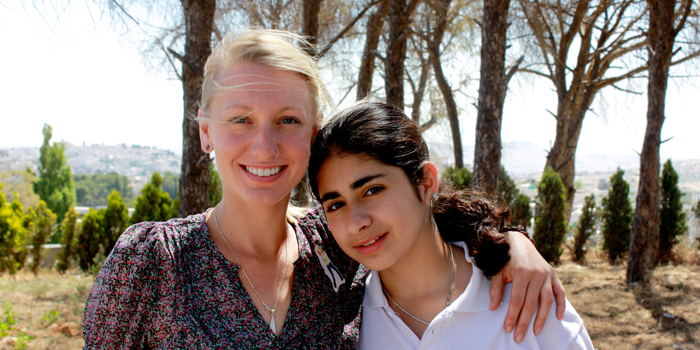 • ELCA young adults in the Jerusalem and West Bank context are asked to become involved regularly with the congregation connected most closely with the community of the site where they serve during the rest of the week. At a minimum, young adults are asked to attend worship and fellowship with an Arabic-speaking congregation at least half of the Sundays. Young adults have sometimes found opportunities in congregations to get involved in activities like providing special music, reading Scripture, developing English-language materials for visitors, errands, working with youth, and so on. This is very welcome, and even encouraged, when it can be done without distracting from the processes and leadership already in place at the congregations. Many young adults also find it helpful to attend worship occasionally with the English-speaking congregation of Redeemer Lutheran Church, which is itself one of the congregations of the Evangelical Lutheran Church in Jerusalem and the Holy Land.
• ELCA young adults in the Jerusalem and West Bank context are asked to become involved regularly with the congregation connected most closely with the community of the site where they serve during the rest of the week. At a minimum, young adults are asked to attend worship and fellowship with an Arabic-speaking congregation at least half of the Sundays. Young adults have sometimes found opportunities in congregations to get involved in activities like providing special music, reading Scripture, developing English-language materials for visitors, errands, working with youth, and so on. This is very welcome, and even encouraged, when it can be done without distracting from the processes and leadership already in place at the congregations. Many young adults also find it helpful to attend worship occasionally with the English-speaking congregation of Redeemer Lutheran Church, which is itself one of the congregations of the Evangelical Lutheran Church in Jerusalem and the Holy Land.
It should also be stressed that the relational aspects of the ELCA Young Adults in Global Mission program are as important as what we get done. The program helps foster relationships, builds bridges across communities, and improves cross-cultural understanding. The service work is important, but it is only one part of the experience that makes it meaningful for most ELCA young adults.
Evangelical Lutheran Church in Jordan and the Holy Land (ELCJHL)

The Evangelical Lutheran Church in Jordan & the Holy Land (ELCJHL) is known for its warmth and hospitality as it welcomes visitors and pilgrims to the Holy Land from around the world. Though Palestinian Christians have been here since the first Pentecost, the roots of the ELCJHL are in the mid-19th century when German and English missionaries came to teach and minister to the local people. Today, we have five congregations in Jerusalem, Ramallah and the Bethlehem area and one in Amman, Jordan. The churches in Amman and Ramallah are comprised largely of families of refugees who fled their homes at the time of the tragic wars that followed the formation of Israel. We also operate four schools and four education programs.
The Evangelical Lutheran Church in Jordan and the Holy Land serves the Palestinian Christian community and beyond.
God calls the ELCJHL to proclaim the Gospel within an Arab context in the Holy Land. This proclamation of the Kingdom of God and the message of salvation is to Arabs, including Palestinians, and is expressed both through witnessing to the Gospel as well as through diakonia.
God calls us to serve the poorest of the poor and to care for people who have suffered long because of the difficult
political situation in this area.
Although the ELCJHL is a minority church we do not have a minority complex. Rather, we consider ourselves to be salt in the society, as God calls us to be. For this reason we seek to serve our Palestinian people through education that aims to provide Christian evangelical instruction, quality training and peace education. The ELCJHL is called to serve the marginalized, the elderly, those who suffer or are traumatized, and all who are in need – regardless of race, gender or political affiliation.
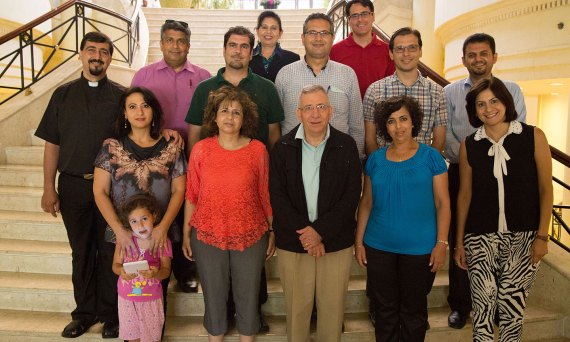 The ELCJHL empowers youth, women, men, and children, encouraging all our baptized members to be the people of God in service and witness.
The ELCJHL empowers youth, women, men, and children, encouraging all our baptized members to be the people of God in service and witness.
The ELCJHL ministers with the other 12 churches of the Holy Land. Together we promote unity, make a joint witness and seek to speak with a prophetic voice against any kind of injustice or any violation of human rights.
The ELCJHL is a catalyst for a just peace, working as bridge builders among the nations. We seek to be brokers of justice, ministers of reconciliation, and apostles of love.
The ELCJHL, with the other churches, seeks to live and witness within a Muslim world and seeks to create a paradigm of Christian-Muslim relations.
The ELCJHL, with the other churches, seeks also to live with Jews in a just and equitable coexistence.
The ELCJHL engages in interfaith dialogue, seeking to cooperate positively for a just peace throughout the Middle East.
The ELCJHL is the local expression of the Lutheran communion worldwide. It works in partnership and companionship with other Lutherans who have come to the Holy Land and with Lutheran Churches and agencies throughout the world.
Our Congregations
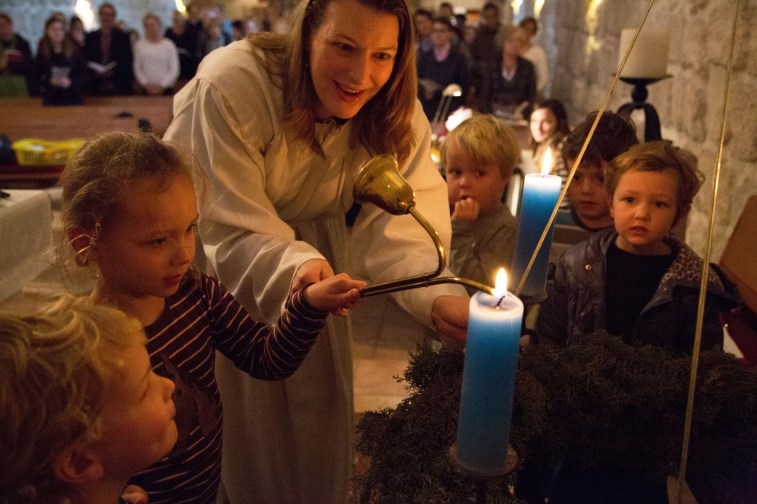 Although the diaconal ministries of the church were the first to take root in the area in 1851, the congregational ministries of the ELCJHL are the center of this small but vibrant church’s life. Each of the six ELCJHL congregations began at the request of the local Arab-Christian population. In some cases, it was graduates of the Lutheran Schools that came together in requesting a congregational home. In the cases of the Evangelical Lutheran Church of Hope in Ramallah, and the Evangelical Lutheran Church of the Good Shepherd in Amman, the church responded to the needs of Palestinian refugees.
Although the diaconal ministries of the church were the first to take root in the area in 1851, the congregational ministries of the ELCJHL are the center of this small but vibrant church’s life. Each of the six ELCJHL congregations began at the request of the local Arab-Christian population. In some cases, it was graduates of the Lutheran Schools that came together in requesting a congregational home. In the cases of the Evangelical Lutheran Church of Hope in Ramallah, and the Evangelical Lutheran Church of the Good Shepherd in Amman, the church responded to the needs of Palestinian refugees.
The congregations worship together each Sunday, with various other Bible study, social, and cultural events throughout the week. Special youth and women programs are developed in different parishes. The pastors of the ELCJHL are committed to their congregations, providing a tremendous pastoral work. All of the congregational pastors of the ELCJHL grew up in the church. Many have graduated from ELCJHL schools and been involved with congregational and educational programs since birth. These future pastors then went on to study theology internationally, but all were eager to return home to Jordan and the Holy Land.
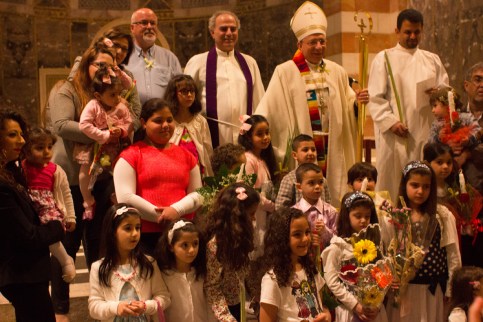 The congregations of the ELCJHL are integrally interwoven in the educational ministries of the ELCJHL. Each of the congregations of the ELCJHL are also involved greatly in their local communities, the following offer a few examples:
The congregations of the ELCJHL are integrally interwoven in the educational ministries of the ELCJHL. Each of the congregations of the ELCJHL are also involved greatly in their local communities, the following offer a few examples:
– In Beit Sahour, the Evangelical Lutheran Church, working out of a very broad ecumenical policy, strives to “build awareness of the role of Christians in the Palestinian society and the importance of non-violence as a means for change.”
– In Ramallah, the Evangelical Lutheran Church of Hope is very involved and active in Women’s ministries and the ELCJHL Women’s Desk in “striving to be a good example in the Palestinian society, promoting gender awareness in all its work, ministries, and institutions.”
– In Jerusalem, the Evangelical Lutheran Church of the Redeemer is responding to needs of the elderly population through the Martin Luther Community Development Center. Christian and Muslim elders alike are welcomed and invited.
– In Bethlehem, the Evangelical Lutheran Christmas Church continues to grow in service to the community as Dar al-Kalima College joined Dar al-Kalima Evangelical Lutheran School and Dar al-Kalima Wellness Center this fall.
– In Beit Jala, the Evangelical Lutheran Church of the Reformation, offers a place of rest to pilgrims at its Abraham’s Herberge guesthouse, with a vision that is open to all.
– In Amman, the Evangelical Lutheran Church of the Good Shepherd invites the community in, as it opens its al-Khoimeh Community Center to local groups and events.
Life for Christians Behind the Wall
While millions of tourists come and go from the Holy Land each year, life for Christians both in Jerusalem and the Occupied Palestinian Territories is not what it may seem if you are visiting for only a few days or do not take the time to hear the stories of those you meet. We invite you make the time listen, learn, and grow in your understanding of the complex life in Palestine under Israeli occupation in order that you might return to your home country and share what you have learned. The Holy Land cannot heal nor again prosper as long as the world outside believes only what is displayed on TV.
Our Schools
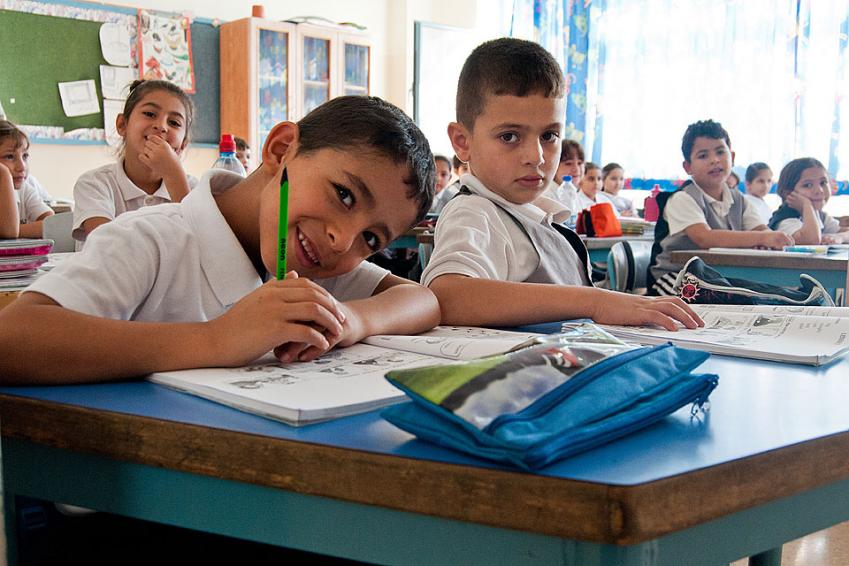 The ELCJHL Director of Education Office is responsible for the four K-12 ELCJHL Schools and the 3 Educational Programs of the ELCJHL. The ELCJHL Schools have a long history of service to the Palestinian communities, dating back to the foundation of an orphanage and educational program for Arab girls in 1851. This was the first education program for the female
The ELCJHL Director of Education Office is responsible for the four K-12 ELCJHL Schools and the 3 Educational Programs of the ELCJHL. The ELCJHL Schools have a long history of service to the Palestinian communities, dating back to the foundation of an orphanage and educational program for Arab girls in 1851. This was the first education program for the female
youth of Palestine. Today, the four schools are serving more than 2,000 students with the help of nearly 200 full- and
part-time educators. Since their beginnings, ELCJHL schools have served the youth of their communities, regardless of gender, race, religion, or ability to pay.
Gender balance and equality is still an emphasis of the ELCJHL Schools, with all schools learning together in a coeducational framework in which 44% of students are female and 56% of students are male. Peace Education and Interfaith Dialogue are also key emphases of the ELCJHL Schools. Muslim and Christian populations in ELCJHL Schools reflect closely the populations of their communities. On the whole, 52.5% of ELCJHL students are Christian, and 47.5% of students are Muslim.
• Dar al-Kalima Evangelical Lutheran School in Bethlehem
• The Evangelical Lutheran School in Beit Sahour
• The Evangelical Lutheran School of Hope in Ramallah
• Talitha Kumi Evangelical Lutheran School in Beit Jala
Learn more about individual strengths and personalities of the four k-12 ELCJHL Schools here:
http://www.elcjhl.org/department-of-education/schools/
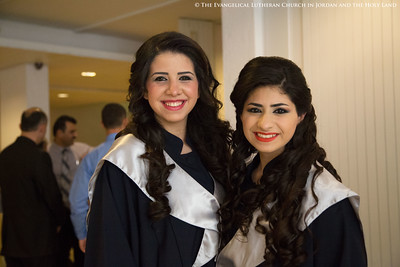 The ELCJHL Schools and Educational Programs are the educational ministry of the ELCJHL, designed to meet the needs of the Palestinian people as a whole. In embracing and empowering students and families in the region from all religious, economic and social backgrounds, the programs provide the opportunity to live and to learn under the Gospel of Jesus Christ. As each person is created in the image of God, the freedom and dignity of each person is inviolate; we are thus called to accept each other’s gifts, talents and weaknesses.
The ELCJHL Schools and Educational Programs are the educational ministry of the ELCJHL, designed to meet the needs of the Palestinian people as a whole. In embracing and empowering students and families in the region from all religious, economic and social backgrounds, the programs provide the opportunity to live and to learn under the Gospel of Jesus Christ. As each person is created in the image of God, the freedom and dignity of each person is inviolate; we are thus called to accept each other’s gifts, talents and weaknesses.
The work of the ELCJHL Schools and Educational Programs is guided by nine overarching goals that form and shape all that we do:
1. To develop wholesome, creative, and innovative students through a holistic approach to education that addresses their needs and develops their talents, competencies, inclinations, and ability to cope in an everchanging world.
2. To integrate peace education and culture, reinforce democracy, and encourage tolerance, co-existence, love, and respect toward others.
3. To ameliorate the communication process and encourage exchanges with local and international communities.
4. To mold and reinforce the national and Christian Palestinian identity.
5. To provide quality and innovation in teaching and learning
6. To create a healthy, motivating, stimulating and nurturing school environment.
7. To appreciate individual differences and assist in integrating students with special needs and/or disabilities in the school and the community.
8. To reinforce and support the role of women in Palestinian society.
9. To be financially responsible.
Youth Ministry
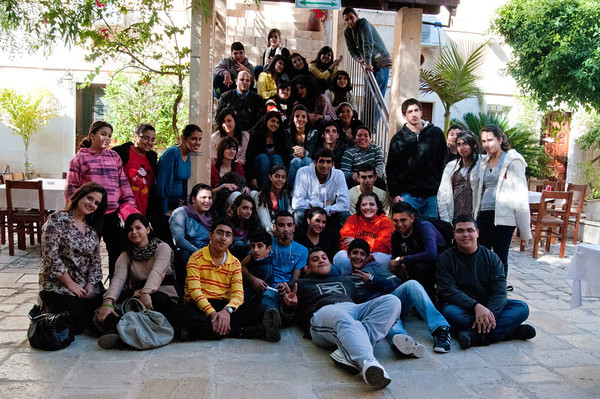 Youth Ministry is an integral part of the congregational and churchwide ministries of the ELCJHL. Ranging between Sunday School, Scouts, Youth Groups and Young Adult Groups, individual ELCJHL congregations work to meet the youth of their congregations where they are, and to integrate them into the life of the congregation. Meetings vary, including Bible study, singing, and relationship-building. The ELCJHL also works to build relationship on both churchwide and international levels. This, at times, can be very difficult, due to the continuing situation in Jerusalem and other parts of the West Bank. But, therefore, it is all the more important for the church to offer ways and means to connect Palestinian Lutherans together, despite the barrier.
Youth Ministry is an integral part of the congregational and churchwide ministries of the ELCJHL. Ranging between Sunday School, Scouts, Youth Groups and Young Adult Groups, individual ELCJHL congregations work to meet the youth of their congregations where they are, and to integrate them into the life of the congregation. Meetings vary, including Bible study, singing, and relationship-building. The ELCJHL also works to build relationship on both churchwide and international levels. This, at times, can be very difficult, due to the continuing situation in Jerusalem and other parts of the West Bank. But, therefore, it is all the more important for the church to offer ways and means to connect Palestinian Lutherans together, despite the barrier.
ELCJHL Churchwide Youth Ministry
In recent years, the ELCJHL has placed renewed focus on empowering and equipping its youth, developing Churchwide programs for Sunday School teacher and curriculum development, youth leadership development, and relationship-building amongst the ELCJHL congregations.
Recent events and programs have included:
– Sahiroon Youth Leadership Training: This program, now in its third year, has invited its youth (13-18) to delve into study–Old Testament, New Testament, and Lutheran Theology–and to equip themselves for leadership in the present.
– Summer Camp: The ELCJHL has hosted summer camps for ELCJHL youth (13-18) and young adults (18-23).
– Sunday School teacher training: The ELCJHL has offered training programs for Sunday School teachers.
– Jubilate Sunday: An opportunity to gather together for study and socialization, the annual Jubilate Sunday brings together youth from across the ELCJHL.
International Relationship-Building
It is, at times, easier to send ELCJHL Youth abroad than it is to gather the youth from all six ELCJHL congregations together in Jerusalem, other parts of the West Bank, or in Amman, Jordan. This is due to factors such as the separation barrier, checkpoints, and visa and permit issues. International trips in recent years have included exchanges between the United States, Germany, Switzerland, Norway and Sweden, among others. Youth return from these exchange experiences with great joy and excitement, and truly blossom through these opportunities.
Source: http://www.elcjhl.org/elcjhl-ministries/youth-ministry/
For more information about the Youth Ministry of the ELCJHL, to learn of upcoming events, or to inquire about relationship-building opportunities, please contact: Rev. Ashraf Tannous, [email protected]
Our Programs
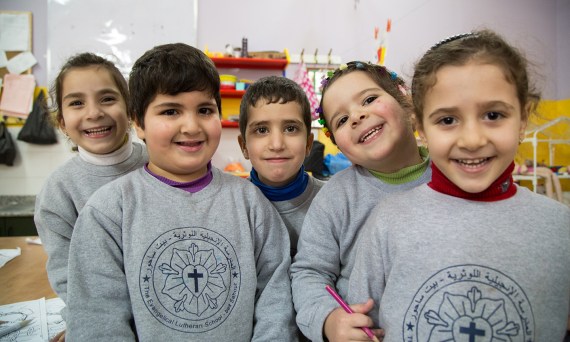 The Educational Programs of the ELCJHL extend the reach of our Educational Ministry in serving the broader educational
The Educational Programs of the ELCJHL extend the reach of our Educational Ministry in serving the broader educational
needs of the Palestinian people. They reach many different age and interest groups, addressing questions and concerns
of Palestinian families and empowering them for work in their communities. Below are just a few examples of their involvement and impact on Palestinian life and culture. Click on the highlighted program links in each description to learn more about these exciting ministries:
– The Al-Mahaba Kindergarten on the Mount of Olives in Jerusalem offers a warm, bright, and safe place for children of East Jerusalem – Muslim and Christian, local and international – to learn and grow together.
– The Environmental Education Center in Beit Jala invites students from all over the West Bank to learn not only about their ecosystem, but care of creation, world geography, and freedom through many programs, including offering sanctuary to Palestinian birds.
– The Martin Luther Community Development Center in the heart of the Old City of Jerusalem opens its doors to
Muslim and Christian elders, offering a space for the social, mental, and physical stretching of one’s legs.
COCOP Partners
COCOP, or the The Coordination Committee for Cooperation between the ELCJHL and Overseas Partners, started in 1978
with an aim to support the ELCJHL in its ministries. It has since turned into a partnership between the ELCJHL and its
overseas partners, with voting members from all parties. The Bishop of the ELCJHL acts as the Chairperson and the
Co-Chair is elected every two years from the partner churches.
Church of Sweden (CoS)
Berliner Missionswerk (BMW)
The United Evangelical Lutheran Church of Germany (VELKD)
Finnish Evangelical Lutheran Mission (FELM)
Evangelical Lutheran Church in Northern Germany (ELCNG)
Evangelical Lutheran Church in America (ELCA)
Church of Norway (CoN)
Evangelical Lutheran Church in Canada (ELCIC)
Evangelical Church of Germany (EKD)
Affiliated Member
Lutheran World Federation (LWF)
Companion Churches
The ELCJHL has a number of companion synods and dioceses throughout the world. We partner with these churches in prayer and mission. Many have been to see us and a number of our youth have been to see them. We are blessed by their commitment to us and we pray that we can as strongly commit to them.
Evangelical Lutheran Church of Finland, Diocese of Kuopio
Church of Sweden, Diocese of Strängnäs
Church of Norway, Diocese of Borg
Evangelical Lutheran Church in Bavaria, Dekanat Bad Tölz
Evangelical Lutheran Church in America, New England Synod
Evangelical Lutheran Church in America, Southeast Michigan
Ecumenical Partners
Since joining the Fellowship of Middle East Evangelical Churches (FMEEC) in 1974, the ELCJHL has been known for their
ecumenical work in the Holy Land and throughout the world, creatively working towards a solution to very tense and difficult problems in the Middle East.
Fellowship of Middle East Evangelical Churches (FMEEC)
The Ecumenical Accompaniment Programme in Palestine and Israel (EAPPI)
Department of Service to Palestinian Refugees of the Middle East Council of Churches (DSPR/MECC)
Palestine Israel Ecumenical Forum (PIEF)
Jerusalem Inter-Church Centre (JIC)
Council of Religious Institutions of the Holy Land (CRIHL)
World Council of Churches (WCC)
Partners | Memberships | Ecumenical
Memberships
Lutheran World Federation (LWF)
Middle East Council of Churches (MECC)
Fellowship of Middle East Evangelical Churches (FMEEC)
Near East School of Theology (NEST) Board of Trustees
ACT Palestine Forum
World Council of Churches (WCC)
Website: http://www.elcjhl.org/
The Lutheran World Federation (LWF) – Jerusalem Program
The Lutheran World Federation has been serving the needs of Palestinian refugees in the Palestinian Territories for more than 65 years. As a major Christian presence on the Mount of Olives, the LWF/DWS Jerusalem Program provides essential health care, vocational training, scholarships and material aid, and promotes justice, peace and reconciliation. This service, or “diakonia,” is the embodiment, through human actions, of God’s love for the world, and it is the very essence of what it means to be the church in a place suffering from poverty and injustice.
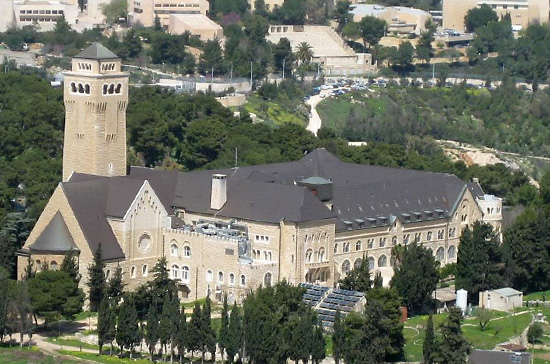 The Lutheran World Federation’s Augusta Victoria Hospital provides specialty care for Palestinians from across the West Bank and the Gaza Strip. The Cancer Care Center, the Artificial Kidney Unit (dialysis), the Ear, Nose and Throat Department, the Diabetes Care Center, the Specialized Center for Child Care, and the Skilled Nursing and Long-Term (Sub-Acute) Care Unit provide specialized treatments that are not available in the majority of hospitals in Palestine. The hospital is in the process of establishing the first bone marrow transplantation unit and also a separate building for elder care.
The Lutheran World Federation’s Augusta Victoria Hospital provides specialty care for Palestinians from across the West Bank and the Gaza Strip. The Cancer Care Center, the Artificial Kidney Unit (dialysis), the Ear, Nose and Throat Department, the Diabetes Care Center, the Specialized Center for Child Care, and the Skilled Nursing and Long-Term (Sub-Acute) Care Unit provide specialized treatments that are not available in the majority of hospitals in Palestine. The hospital is in the process of establishing the first bone marrow transplantation unit and also a separate building for elder care.
The LWF’s Vocational Training Program (VTP) has been providing vocational training to Palestinian youth since 1949. In 2012, the VTP began a new chapter in its history with the opening of three new departments: catering and craftwork departments in Beit Hanina and a vocational secretary department at the VTCR. These departments have significantly increased the VTP’s outreach to women. In addition to these three new departments, the VTP offers training in auto-mechanics, auto-electronics, carpentry, metalwork, aluminium work, telecommunications, and plumbing and central heating.




